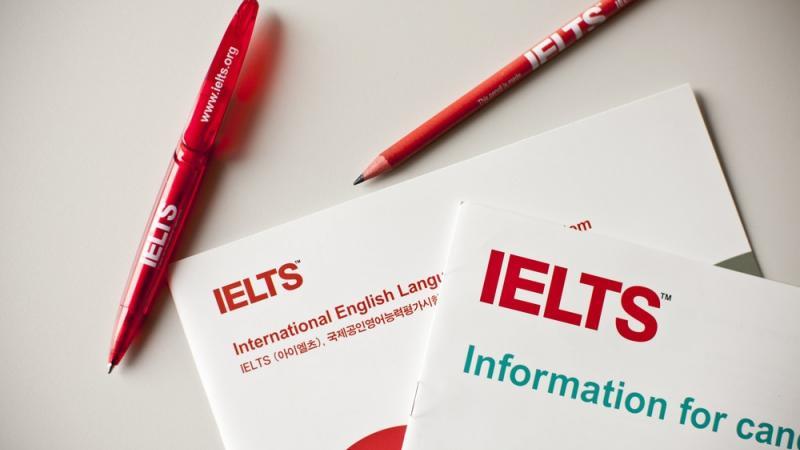The International English Language Testing System (IELTS) is conducted jointly by the British Council, the University of Cambridge ESOL Examinations (known popularly as the Cambridge ESOL) and IELTS Australia, which is the sub-division of IDP, the leading educational organization of the country of Australia.
IELTS measures Reading, Writing, Listening and Speaking skills of the candidates in English. About 5,000 government agencies, educational institutions and professional organisations around the world accept IELTS scores as proof of English proficiency of the candidates.

Over 9,38,000 people take this test across 120 countries. IELTS scores range from Band 1 to 9, with Band 1 score indicating the non-user and Band 9 indicating the expert user who has full command of the English language.
IELTS Test Format
All candidates need to complete four modules of Listening, Reading, Speaking and Writing to obtain an IELTS Test Report. Listening and Speaking modules are same for all candidates but students may choose to one of the following two versions of Reading and Writing Modules:
Academic Training Modules – It assesses whether the candidate can study undergraduate or postgraduate courses in English medium. The admission to academic programs of overseas institutions is based on the results of these modules.
General Training Modules – Though, this test does not test full range of formal language skills needed in academic environments, it emphasizes on survival skills of a candidate in broader areas of social and educational scenarios. These scores are meant for students who want to immigrate to Australia, Canada or New Zealand, complete their secondary education or undertake non-degree training programmes in English-speaking countries.
Important:
General Training modules may not be available at all the test centres.
Students have to specify their choice of test version at the centre and centres are not responsible for giving them this information.
In some of the selected test centres, candidates can opt to take computer-based IELTS test for Academic Training modules at the same cost as the paper-based test. The result of Computer Based IELTS can be expected in 13 calendar days from the day the candidate takes the test.
| Skill Tested | No. of Sections/Tasks | No. of Items/Words | Alloted Time |
| Listening | 4 Sections | 40 | 30 minutes |
| Reading | 3 Sections | 40 | 60 minutes |
| Writing | 2 Sections | 1st for 150 words and 2nd for 250 words | 60 minutes |
| Speaking | – | 11 to 14 minutes | |
| Total Test Time | 2 hours 45 minutes |
Listening, Reading and Writing Modules have to be attempted in one day but the Speaking Module can be taken seven days before or after the other Modules, at the discretion of the test centre.

IELTS registration
You must apply to a test centre to take an IELTS test prior to the test date. Submit the IELTS application form in the test centre with the test fee, two passport sized photographs and a photocopy of your passport.
The test centre will confirm the date and time when you want to take your IELTS test.
You will need to take the passport or other identification number, you have mentioned in the admission form, while taking the test.
Tips and Strategies
Like all exams, it is best to prepare for IELTS exam even if you are a master in the use of English language. The fees for the test is high and a person who achieves a low band score in IELTS will have to wait for at least three months, before he or she can appear for the test again. Thus, even if you have good level of English, it is best to spend at least two weeks for IELTS preparation.
Be aware of the format of the test and the types of questions that are usually asked in the IELTS test.
Work diligently through various IELTS practice tests and IELTS sample tests that are available online and as part of the various study material packages so that you can achieve a high band score. Here are some tips and strategies that will help you to better equip yourself for-

IELTS:
- IELTS does not penalize you for wrong answers, so attempt all questions.
- For people with medium-level English, it is a good idea to opt for a four-day IELTS preparatory course offered by the British Council. It is an intensive course and offers substantial practice sessions. However, people a very high level of English levels may not find it worth their money.
- There are no breaks between the different test sections. It is not advisable to waste time in the middle of the test. Hence, visiting the restroom before entering the examination hall is a wise thing to do.
Check all the documents that you need to carry for the exam before leaving for the test. This includes:
- Original and valid passport,
- Letter containing your roll number and test venue, and
- Fee receipt.
- You can use only pencils for listening and reading sections. So, do not forget to take sharpened pencils, a pencil sharpener and a good eraser along with you.
- Be aware of the time limit that you can spend on each question.
- Listening to a recording over speakers and through cordless headphones are two distinct experiences. It is best to check with your test centre to know beforehand what method do they use for the test and practice likewise.
- Listen very carefully as the recordings are played only once. Sections 1 and 3 are dialogues and conversations are generally faster than the monologues in sections 2 and 4.
- The voice on the tape tells you how many questions to read for a particular section. Underline the key words in each question in the time allotted to read and concentrate on them while listening to the section of the recording.
- Jot down the answers on the question sheet itself. In the end, you will have 10 minutes of time to transfer all your answers to the answer sheet.
- At the end of each section, you get time to re-check your answers. You may use this time to read the questions of the next section.
- Generally, in a conversation answers appear in the same order as the questions. A speaker may correct himself or herself while speaking something. So, be alert to note the corrections that have been made to judge the final answer correctly.
Dates and Deadlines
Every year, students can take IELTS on one of the 48 fixed test centers. Local test centres may offer the test on some or all of these dates. You will need to contact your test centre to known on which dates they will be offering IELTS.
Contact us
About Us

The team at Dynamic study planet provides you with the best solution based on their expertise and in-depth knowledge about international education.
Address :
Jalandhar -
(Head Office)
923, First Floor, Near Bus Stand, Gate No. 5, G.T. Road, Jalandhar -144001
- +91 99149-23322/0181-4643322
Ludhiana -
(Branch Office)
2k Tower, Link Road, Adjoining passport Office, Ludhiana
- +91 91155-13322/0161-4066591
- info@dynamicstudyplanet.com



